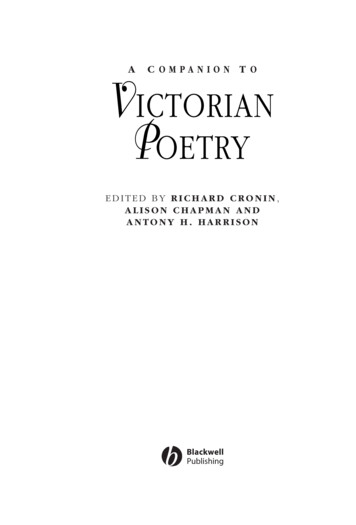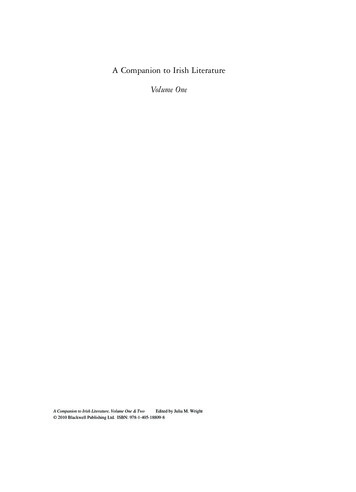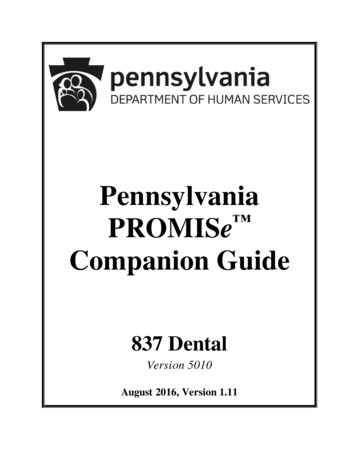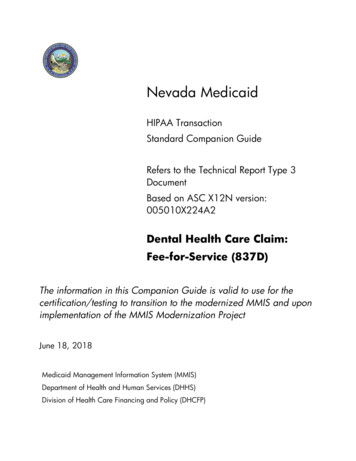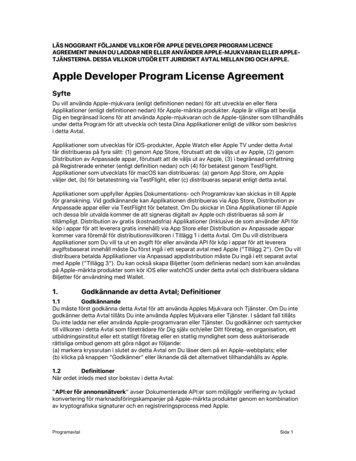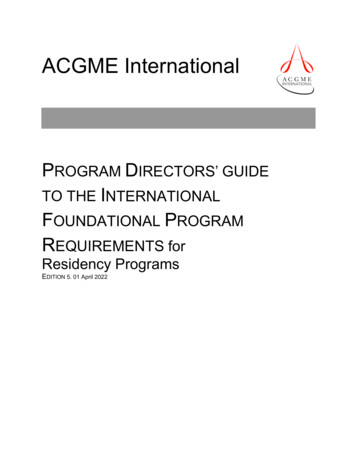
Transcription
ACGME InternationalPROGRAM DIRECTORS’ GUIDETO THE INTERNATIONALFOUNDATIONAL PROGRAMREQUIREMENTS forResidency ProgramsEDITION 5. 01 April 2022
Accreditation OverviewTo be accredited, residency programs must demonstrate substantial compliance withrequirements established by ACGME International (ACGME-I). Before obtainingAdvanced Specialty Accreditation, each program must demonstrate substantialcompliance with the International Foundational Program Requirements.As part of the accreditation process, program information is collected from a variety ofsources, including: program-specific information provided by the program director andentered into the ACGME-I’s Accreditation Data System (ADS); the AdvancedSpecialty Application; ACGME-I Resident and Faculty Survey responses; case andprocedural logs; and information collected by Accreditation Field Representativesthrough the site visit. ADS addresses questions related to the InternationalFoundational Program Requirements, and the program’s application addressesquestions related to Advanced Specialty Requirements.During an accreditation site visit, the ACGME-I Accreditation Field Representativeinterviews the program director, core faculty members, residents/fellows, clinicaldepartment leadership, the designated institutional official (DIO), and other relevantpersonnel, tailoring questions to the individuals interviewed. The goal is to verify theinformation in ADS, the program application, and the required attachments, and toclarify any missing or unclear information by seeking to achieve consensus across allparticipants and other sources of information. On occasions when a consensus cannotbe achieved at the end of the site visit, the Accreditation Field Representative reportsthe sources of the information and aggregates the findings into an objective, factualreport that describes the program’s compliance with the International Foundational andAdvanced Specialty Requirements.All ACGME-I-accredited residencies with a status other than Initial Accreditationare reviewed annually. Annual compliance is judged using information enteredinto ADS as part of the program’s Annual Update, results of the ACGME-IResident/Fellow and Faculty Surveys, the program’s responses to citations and,where required, graduates’ Case Logs.This Program Directors’ Guide to the International Foundational Requirementsincludes explanations of the intent of most foundational requirements,suggestions for implementing requirements, and bulleted guidelines for the typesof expected documentation. The explanations and expected documentation in thisGuide relate only to the International Foundational Program Requirements.Program directors should consult their Advanced Specialty Requirements andprogram application for additional information. Advanced Specialty Requirementsand applications are available on the specialty’s web page on the ACGME-Iwebsite, www.acgme-i.org. 2022 ACGME International (ACGME-I)2 of 73
To enhance usability, the Guide has been organized to follow the numbering of theInternational Foundational Program Requirements. The Guide is intended to clarify themeaning and expectations of the International Foundational Program Requirements. Itwill be regularly revised based on user feedback, and as requirements change. Emailcomments and suggestions to acgme-i@acgme-i.org.Guide Format:a.b.The requirements themselves are listed first on the pagesData entry points for ADS are noted with an arrow.No part of this work may be reproduced or distributed in any form or by any meanswithout the ACGME-I’s prior written approval. Requests for permission to copy shouldbe made by email to acgme-i@acgme-i.org. 2022 ACGME International (ACGME-I)3 of 73
Foundational Requirements Content Outlineclick on each heading to go directly to that section of the documentPAGECONTENTSAccreditation Overview . 2ACKNOWLEDGEMENTS . 6I. Sponsoring InstitutionsI.A.InstitutionsDefinition of Terms: . 7Explanation: . 7I.B.Institutions. Participating SitesDefinition of Terms: . 10Explanation . 11II. Program Personnel and ResourcesII.A. Program Personnel and Resources. Program Director . 13Definition of Terms: . 14Explanation: . 14II.B. Program Personnel and Resources. FacultyDefinition of Terms: . 18Explanation: . 19II.C.-D. Other Program Personnel and ResourcesDefinition of Terms: . 21Explanation . 22III. Resident AppointmentsIII.A.-D. Resident AppointmentsDefinition of Terms: . 24Explanation: . 25IV. Educational ProgramIV.A. ACGME-I CompetenciesDefinition of Terms: . 28Explanation: . 28IV.B. Regularly Scheduled Educational ActivitiesDefinition of Terms: . 29Explanation: . 29IV.C. Clinical ExperiencesDefinition of Terms: . 31Explanation . 32IV.D. Scholarly ActivityExplanation . 32 2022 ACGME International (ACGME-I)4 of 73
V. EvaluationV. A.1.-2. Formative Evaluation and Summative EvaluationDefinition of Terms: . 38Explanation: . 39V.B.Clinical Competency CommitteeDefinition of Terms . 45Explanation: . 45V.C. Faculty EvaluationExplanation: . 47V.D. Program Evaluation and Improvement and Program Evaluation Committee . 50Definition of Terms: . 51Explanation: . 51VI. The Learning and Working EnvironmentVI.A. PrinciplesDefinition of Terms: . 55Explanation: . 55VI.B.-C. Patient Safety and Quality ImprovementDefinition of Terms: . 57Explanation: . 57VI.D. Supervision and AccountabilityExplanation: . 60VI.E. ProfessionalismDefinition of Terms: . 62Explanation: . 62VI.F. Well-BeingDefinition of Terms: . 64Explanation:: . 64VI.G.-H. Fatigue and Transitions of CareDefinition of Terms: . 67Explanation: . 67VI.I.-J. Clinical Experience and Education and On-Call ActivitiesDefinition of Terms:. 70Explanation: . 71Appendix 1. Table of Required ApprovalsAppendix 2. List of ReferencesLinks to additional useful resources: ACGME-I Glossary of Terms Institutional Requirements Foundational Requirements 2022 ACGME International (ACGME-I)5 of 73
ACKNOWLEDGEMENTSThe Program Directors’ Guide to the International Foundational Program Requirementsisprepared by ACGME-I staff members. It is a guide and does not supplant theFoundational, Advanced Specialty, or Institutional Requirements, which provide allapplicable requirements and are used by the International Review Committee to makeaccreditation decisions for Sponsoring Institutions and programs.When applicable to ACGME-I, the Program Directors’ Guide to the InternationalFoundational Program Requirements includes Background and Intent Statements fromthe ACGME Common Program Requirements, which are accessible ommon-Program-Requirements,and information and guidance contained in the ACGME Program Directors’ Guide to theCommon Program Requirements, accessible at nProgram-Requirements. 2022 ACGME International (ACGME-I)6 of 73
I.InstitutionsA. Sponsoring InstitutionFoundational Requirement:1.2.One Sponsoring Institution must assume ultimate responsibility for the program, as describedin the Institutional Requirements, and this responsibility extends to resident assignments at allparticipating institutions. [Requirement I.A.1.]The Sponsoring Institution and the program must ensure that the program director hassufficient protected time and financial support for the educational and administrativeresponsibilities to theprogram. [Requirement I.A.2.]Definition of Terms:Protected time – Protected time is an accommodation that allows program directorsto devote a portion of their total effort to the educational program. Protected timeoccurs during regular business hours and is professional time that is dedicated toteaching, mentoring, and evaluating residents, and to administrative dutiesassociated with the residency program, such as evaluating faculty members,monitoring resident work hours and clinical Case Logs, and preparing and submittinginformation to ACGME-I. Protected time for educational and administrative activitiesdoes not include providing direct clinical care, engaging in research that does notinclude residents, and fulfilling departmental or institutional administrativeresponsibilities.Sponsoring Institution – The organization (or entity) that assumes the ultimatefinancial and academic responsibility for the residency program. The SponsoringInstitution has the primary purpose of providing educational programs and/or healthcare services. A university, medical school, hospital, school of public health, healthdepartment or public health agency, an organized health delivery system, orambulatory clinic are all examples of entities that can be Sponsoring Institutions.Explanation:Since requirements in this section are for institutions, not programs, verification ofinstitutional support takes place at the time of a site visit primarily through theAccreditation Field Representative’s interview with the designated institutional official(DIO) and Department Chair.A. Sponsoring Institution’s ResponsibilitySponsoring Institution requirements support these International FoundationalProgram Requirements by requiring that an accredited residency program mustoperate under the authority and control of a single Sponsoring Institution, and thatinstitution must document its commitment to provide the necessary educational,financial, and human resources to support graduate medical education. 2022 ACGME International (ACGME-I)7 of 73
One way the Sponsoring Institution carries out the responsibility for oversight ofits programs is by reviewing all program Letters of Notification and monitoringaction plans for correction of citations and areas of non-compliance withACGME-I requirements. The GMEC is also responsible for establishing criteriafor adequate program performance and providing oversight of underperformingprograms through a Special Review Process. These GMEC responsibilities donot substitute for the annual self-evaluation that each program is required toconduct (Foundational Requirement V.D.). Documentation of Sponsoring Institution Responsibilities: Throughinterviews with the DIO, the Accreditation Field Representative will look forevidence that the GMEC is conducting a regular review of program Lettersof Notification and monitoring action plans for correction of areas of noncompliance.B. Resources Required of the Sponsoring InstitutionInstitutions must provide services that help to ensure that residents/fellows do notperform work extraneous to achieving educational goals and objectives. Thisincludes patient support services, such as peripheral intravenous (IV) accessplacement, phlebotomy, laboratory/pathology/radiology services, messenger andtransport services, and medical records systems. Institutions must also provideresources that ensure a healthy and safe work environment for residents/fellows.This includes access to food 24 hours a day; call rooms that are safe, quiet, andprivate; and security and safety measures, including parking facilities, on-callquarters, hospital and institutional grounds, etc. Institutions must also provide bothfaculty members and residents/fellows with ready access to adequatecommunication resources and technology support, and to specialty-/subspecialtyspecific and other appropriate reference material in print or electronic format,including electronic medical literature databases with search capabilities.Sponsoring Institutions should be accredited by the Joint Commission International(JC-I) or be recognized by another entity with reasonably equivalent standards asdetermined by ACGME-I.Documentation for Physical/Clinical Facilities: The adequacy of physical and clinicalfacilities will be verified during the site visit through resident/fellow interviews. TheAccreditation Field Representative may also tour facilities if there were prior citationsrelating to these areas, if concerns are raised during the site visit, or if ACGME-I hasAdvanced Specialty Requirements for a program’s patient care or educationalfacilities. There may be Advanced Specialty Requirements for resources. Documentation for Patient Care: The Accreditation Field Representativemay verify patient care accreditation status with JC-I (or anotherrecognized entity)through database information and may clarify and verifyinformation by reviewing the accreditation letter during the DIO interview. 2022 ACGME International (ACGME-I)8 of 73
C. Sufficient Protected Time and Financial Support for the Program DirectorFoundational Requirement II.A.2.d) indicates that the program director must have noless than 50 percent or 20 hours a week of protected time for the administrative andeducational activities of the program. This requirement represents a minimum timeallotment and would likely be insufficient for a residency program with a largenumber of residents or many participating sites. The Review CommitteeInternational judges the adequacy of program director support by verifying if theprogram director has adequate time to meet all the responsibilities outlined inInternational Foundational Program Requirement II.A.2. This is assessed during thesite visit to the program, through the program’s Annual Update, from ACGME-IResident/Fellow and Faculty Survey results, and, when applicable, the Case Logs ofprogram graduates. 2022 ACGME International (ACGME-I)9 of 73
I. InstitutionsB. Participating SitesFoundational Requirements:1.2.3.There must be a program letter of agreement (PLA) between the program and eachparticipating site providing a required assignment. The PLA must approved by the designatedinstitutional official (DIO) and be renewed at least every five years.The PLA should:a) identify the faculty member(s) who will assume both educational and supervisoryresponsibilities for residents;b) specify their responsibilities for teaching, supervision, and formal evaluation of residents,as specified later in this document;c) specify the duration and content of the educational experience; and,d) state the policies and procedures that will govern resident education during theassignment.[Requirement I.B.1]The program director must submit any additions or deletions of participating sites routinelyproviding required or elective educational experiences for the majority of residents throughthe ACGME-I Accreditation Data System (ADS). [Requirement I.B.2.]Resident assignments away from the Sponsoring Institution should not prevent residents’regular participation in required didactics. [Requirement I.B.3.]Definition of Terms:Didactic – A planned, systematic, instructed learning experience, such as a conference,journal club, or grand rounds.Participating site – An organization providing educational experiences or educationalassignments/rotations that are not under the jurisdiction of the Sponsoring Institution.Required rotations that are not in a resident’s specialty department but are within theSponsoring Institution are not participating sites. For example, an intensive care unitwithin the Sponsoring Institution that provides required rotations for emergencymedicine residents is not a participating site. A pediatric hospital that is not part of theSponsoring Institution and is used for required rotations for anesthesiology residents isa participating site. A participating site can be within the Sponsoring Institution’s countryor jurisdiction or can be an out-of-country posting.Site director – The faculty member at a participating site who is responsible for theadministration of the educational program at that site, including assessment of residentsand oversight of the policies and procedures that govern a resident’s education while atthat site. 2022 ACGME International (ACGME-I)10 of 73
Explanation:Program directors are responsible for program letters of agreement (PLAs), althoughthe designated institutional official (DIO) oversees this process. Agreements must be inplace for all sites with required rotations and for sites regularly used for electiveassignments. If a participating site is infrequently used for elective rotations, a PLA isnot required; however, the program should have in place written confirmation of therequired elements of a PLA noted below.The primary purposes of PLAs are to ensure an appropriate educational experience andto protect residents from undue service requirements that do not enrich their education.PLAs are intended to be short, less formal documents. A PLA can be a simple letter ormemo, signed by the program director and the site director, or the medical director. APLA must include four items of information:1. The site director(s) (by name or general group) who teach(es) and supervise(s)residents at the participating site.2. The responsibilities for teaching, supervising, and formal evaluation of residents atthe participating site.3. The duration of experience at the site in each year of the program, the specificeducational purpose of the experience, and the content (both clinical experiencesand formal didactics) of the educational experience. The explanation does notneed to be a curriculum document; it can be a descriptive paragraph thatidentifies the goal(s) and learning outcomes for the assignment or a reference toa more thorough explanation in the resident handbook.4. The policies and procedures governing resident education at this site. This maybea statement that residents must abide by the policies of the site and those of theprogram and the Graduate Medical Education Committee (GMEC).Additions or deletions of a participating site that provides an educational experiencemust be submitted in ADS. Information to be entered in ADS for each participating siteincludes the distance (in miles) and time (in minutes) from the primary clinical site; thename of the site director, whether the experience is required; the date the PLA iseffective; the number of months residents will spend at the site during each year of theprogram; and a brief description of the content of the educational experience at the site,including faculty coverage, volume and variety of clinical experience, site support,andthe impact of the site on the overall education of residents. Finally, ADS will ask aboutresources available at the site, such as sleeping rooms, showers, secure areas,cafeteria, etc. Documentation for PLAs: On program initial applications, all current PLAsare uploaded into ADS. For programs seeking Continued Accreditation,the current PLAs should be available for the Accreditation FieldRepresentative to review. All PLAs should contain the four items listedabove, as well as the required signatures and a date more recent than fiveyears old. Agreements should be updated whenever there are changes inprogram director or site director or resident assignments, or wheneverthere are revisions to the items specified in the International FoundationalProgram Requirements or the Advanced SpecialtyRequirements. 2022 ACGME International (ACGME-I)11 of 73
A. Resident Participation in Required DidacticsACGME-I requires that all residents have the same educational experiences, andthis includes residents not rotating at the Sponsoring Institution. Programs canrepeat required didactics on a regular schedule that will allow all residents to have alleducational experiences prior to graduation. Programs can also provide didacticsessions in multiple locations or use distance technology to provide didactics tothose not at the Sponsoring Institution. 2022 ACGME International (ACGME-I)12 of 73
II. Program Personnel and ResourcesA. Program DirectorFoundational Requirements:1.2.There must be a single program director with authority and accountability for the operation ofthe program. The Sponsoring Institution’s GMEC must approve a change in program director.After approval, the program director must submit this change to the ACGME-I via the ADS.[Requirement II.A.1.]The program director must administer and maintain an educational environment conducive toeducating the residents in each of the ACGME-I Competency areas. The program directormust: [Requirement II.A.2.]a) oversee and ensure the quality of didactic and clinical education in all sites thatparticipate in the program;b) monitor the clinical and working environment at all participating sites;c) provide a learning and working environment in which residents have the opportunity toraise concerns and provide feedback in a confidential manner as appropriate without fearof intimidation or retaliationd) dedicate no less than 50 percent (a minimum of 20 hours per week) of his/herprofessional effort to the administrative and educational activities of the educationalprogram;e) approve a local director at each participating site who is accountable for residenteducation;f) approve the selection of program faculty as appropriate;g) evaluate program faculty and approve the continued participation of program facultybased on evaluation;h) monitor resident supervision at all participating institutions;i) in specialties where ACGME-I Case Logs are required, monitor resident Case Logs atleast semi-annually and counsel residents or revise clinical experiences as needed.j) prepare and submit all information required and requested by the ACGME-I, including butnot limited to the program information forms and annual program resident updates to theADS, and ensure that the information submitted is accurate and complete;k) meet with and review with each resident the documented semiannual evaluation ofperformance including progress on the specialty-specific milestones;l) ensure compliance with grievance and due process procedures as set forth in theInstitutional Requirements and implemented by the sponsoring institution;m) provide verification of residency education for all residents, including those who leave theprogram prior to completion;n) implement policies and procedures consistent with the institutional and programrequirements for resident duty hours and the working environment and must:(1)distribute these policies and procedures to the residents and faculty members;and,(2)monitor resident duty hours, according to institutional and program.o) monitor the need for and ensue the provision of back-up support systems when patientcare responsibilities are unusually difficult or prolonged;p) comply with the Sponsoring Institution’s written policies and procedures, including thosespecified in the Institutional Requirements, for selection, evaluation and promotion ofresidents, disciplinary action, and supervision of residents;q) obtain review and approval of the Sponsoring Institution’s GMEC/DIO before submittingto the ACGME-I information or requests for the following:(1)all applications for ACGME-I accreditation of new programs;(2)changes in resident complement;(3)major changes in program structure or length of training;(4)progress reports requested by the ACGME-I Review Committee;(5)responses to all proposed adverse actions;(6)voluntary withdrawals of ACGME-I accredited programs; 2022 ACGME International (ACGME-I)13 of 73
3.4.(7)requests for appeal of an adverse action; and,(8)appeal presentations to ACGME-I Review Committee.r) obtain DIO review and co-sign off on all program information forms, as well as anycorrespondence or document submitted to the ACGME-I that addresses:(1)program citations; and/or,(2)request for changes in the program that would have significant impact, includingfinancial, on the program or institution.The program director should continue in his/her position for a length of time adequate tomaintain continuity of leadership and program stability. [Requirement II.A.3.]Qualifications of the program director should include: [Requirement II.A.4.]a) a minimum of three years documented experience as a clinician, administrator, andeducator in the program specialty;b) current American Board of Medical Specialty (ABMS) certification in the program specialtyor specialty qualifications that are deemed equivalent or acceptable to the ACGME-IReview Committee; and,c) current medical licensure to practice in the Sponsoring Institution’s host country andappropriate medical staff appointment.Definition of Terms:Learning and working environment – The environment and context for conduct ofresidency education that must emphasize excellence in safety and quality of carerendered to patients by residents; excellence in professionalism through facultymembers providing a humanistic learning environment that includes problem solving,intellectual rigor and discovery; and the commitment to the well-being of residents,faculty members, and all members of the health care team.Milestones – Performance levels residents are expected to demonstrate for skills,knowledge, and behaviors in the six ACGME-I Core Competency domains. TheMilestones lay out a framework of observable behaviors and other attributes associatedwith a resident’s development and as such, describe a learning trajectory that takes theresident from a beginner in the specialty to a highly proficient resident or earlypractitioner. The Milestones are not a complete description of a clinical discipline; theyare not a curriculum or a performance evaluation tool by themselves. The Milestonesare intended for formative purposes to help learners and programs improve. TheMilestones are developed for each specialty and are available on the specialty webpage at on the ACGME-I website, www.acgme-i.org. Programs must reportassessments of each resident on the Milestones semi-annually in the Accreditation DataSystem (ADS).Program director – the individual designated with authority and accountability for theoperation of a residency or fellowship program.Explanation:Programs that have a history of frequent changes may trigger additional inquiry into thecause(s) to determine if the learning environment has been adversely affected. A singleperson (program director) must have authority for the operation of the program. 2022 ACGME International (
its programs is by reviewing all program Letters of Notification and monitoring action plans for correction of citations and areas of non-compliance with ACGME-I requirements. The GMEC is also responsible for establishing criteria for adequate program performance and providing oversight of underperforming programs through a Special Review Process.







